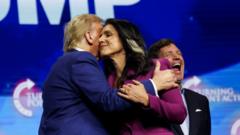United by a common loyalty to former President Donald Trump, his newly appointed team for a potential second term in the White House presents a patchwork of agendas that could complicate governance. While the appointments highlight Trump’s ambition to reshape the government, they also expose underlying divisions among his chosen advisors, each with their unique aspirations and policy goals.
Among the standout appointments are figures such as Matt Gaetz, Tulsi Gabbard, and Robert F. Kennedy Jr., each of whom bring a keen opposition to traditional U.S. policies. Gaetz, nominated as attorney general, has long been a controversial figure with a history of scandals yet remains firmly positioned against the current administration's direction. Gabbard, selected for director of national intelligence, has criticized American foreign policy, particularly regarding NATO and its relationship with Russia. Kennedy, who is set to oversee health policies, is known for his controversial views on vaccines and government regulation, which could clash with Trump's own policies.
On the border and immigration front, advisors Tom Homan, Stephen Miller, and Kristi Noem have pledged a tougher stance, advocating for increased deportations and a return to stricter enforcement practices. Their agenda aligns with a significant voter concern regarding immigration, yet it may create strife with Democratic states resistant to such measures, as well as some Republican-led regions that rely on immigrant labor.
In the realm of technology and economic policy, Trump has turned to influential figures like Elon Musk and Vivek Ramaswamy. Musk's ambitious proposal for government efficiency includes massive spending cuts, though the feasibility of this agenda remains uncertain given Trump’s historically high budgets during his previous term. Ramaswamy's radical proposals further underscore a faction that seeks to confront the status quo through a libertarian lens.
Lastly, the so-called "China hawks" in Trump's team, including Marco Rubio and Mike Waltz, are poised to spearhead a stringent foreign policy, reflecting a consistent character of antagonism towards Beijing. However, Trump's erratic stance on China complicates matters, as he has previously oscillated between aggressive rhetoric and personal praise for Chinese leadership.
As Trump assembles a diverse cohort of advisors, navigating the competing agendas within his administration will be paramount. The interactions and potential conflicts among these factions may significantly influence the effectiveness of Trump’s governance should he reclaim the presidency.





















